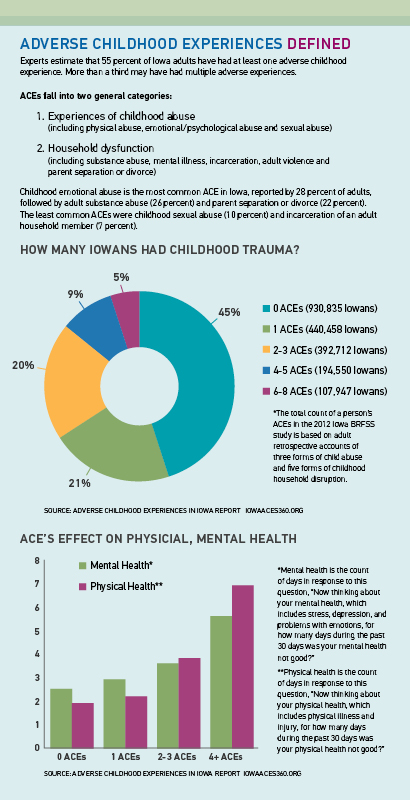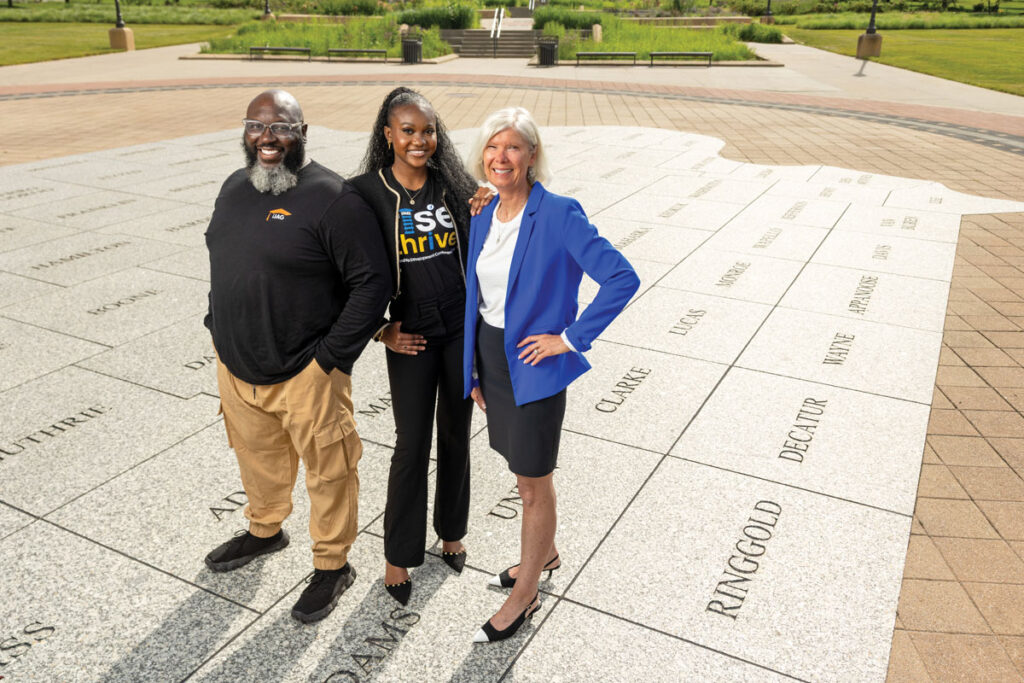Childhood trauma – the invisible impact on workers’ health
Iowa research results are helping to increase productivity, employment

In poker, every player would like to be dealt a handful of aces. But workforce research is showing that another type of “ACE” that life deals —adverse childhood experiences — significantly affects whether children grow up to be healthy, productive members of society.
The more of these experiences, labeled as ACEs, that adults have in their past, the more likely they’re not going to fare well physically or psychologically.
Insight provided through a comprehensive statewide survey in 2012 is giving Iowa employers and social services agencies new tools for recognizing and addressing the effects of ACEs among their workers, and could help to reduce the number of children who experience ACEs as well.
The study, “Adverse Childhood Experiences in Iowa: A New Way of Understanding Adverse Childhood Experiences,” found that toxic stress experienced early in life can have a cumulative toll on an individual’s physical and mental health. Ongoing research by the Centers for Disease Control and Prevention finds that, worst case, trauma in childhood could take as many as 20 years off life expectancy.
“I think it is a game changer for employers, by shining a light on an issue in a way that we hope will be easier for employers to understand,” said Tammy Hoyman, CEO of Employee & Family Resources. “We hear it from employers all the time — anything that you can do to help an employer understand or deal with their people problems is ultimately going to help their business.”
For instance, Employee & Family Resources added a behavioral risk assessment component to its health risk assessments to identify whether employees have potential depression, substance abuse or other psychological disorders that should be addressed.
Another significant workplace program that has been influenced by the ACEs research is Project IOWA (Iowa Opportunities for Workforce Advancement), which provides education and placement programs for individuals who have experienced childhood trauma. Julie Fugenschuh, the program’s director, said the findings from the ACEs study further validate the approach the Des Moines-based nonprofit has taken to provide training to its clients, a majority of whom are being successfully placed with employers.
Likewise, the research has prompted a number of human services agencies in Iowa to launch or revamp programs that address issues related to childhood trauma.
“I think the compelling part of the ACES research was really the breadth of response necessary,” said Suzanne Mineck, president of Mid Iowa Health Foundation, which provided the lead funding for the ACES study. “Really, trauma affects all sectors.”
Among the organizations that Mid Iowa Health Foundation is working with to develop ACEs-related programs are the Young Women’s Resource Center, Lutheran Services of Iowa and Prevent Child Abuse Iowa.
Since 2011, the foundation has invested more than $850,000 in ACEs research, outreach and education, coalition building, and direct program development, and will likely invest between $300,000 and $400,000 more this year, Mineck said.
“We have seen our role at Mid Iowa Health Foundation in the last several years to help create space for the conversation and provide resources around what’s next,” she said.
New focus
Although Employee & Family Resources has offered employee health programs for many years, its focus had always been on mental and emotional health, not physical health, Hoyman said.
“This study really connected physical health with emotional and mental health,” she said. “As a result, we have gotten into wellness programs — and added our expertise in mental and behavioral health.”
Its new program offering, called “Better Living,” adds a behavioral health risk assessment to the traditional employee health risk assessment. The health coaches who work with the program are also qualified in assessing behavioral health issues.
“Our behavioral risk assessment is really a differentiator for us,” Hoyman said. “It identifies for us if there are possibly depression issues, or alcohol, anger, eating disorders or a number of other disorders, which really goes above and beyond your typical health risk assessment.”
Hoyman acknowledged that people will commonly minimize their unhealthy behaviors when asked about them, but the survey goes beyond that.
“The purpose of the survey partially is to plant the seed and to educate the person around what the recommended standards around a certain behavior are,” she said. “For instance, I think a lot of people don’t know whether they may be an alcoholic if they only drink once a month but have 15 drinks — or if they have one drink every day of the month.”
The ACEs research has been valuable to EFR and other agencies — among them Youth Emergency Shelter & Services and Orchard Place — that offer substance abuse prevention programs, Hoyman said.
“If you’re able to do good substance abuse programs, you’re able to build kids’ resilience to help either prevent trauma or heal trauma if it has occurred,” she said. “There’s a lot of good work on trauma-informed care.”
Overcoming barriers
Project Iowa is a 501(c)(3) nonprofit organization in Des Moines that offers workforce development training to people who face barriers to finding employment, such as a past criminal record.
Graduates of Project Iowa’s VIP (Vision, Initiative and Perseverance) classes are eligible to be placed with participating employers. The nonprofit is also working with companies to offer the program to supervisors and midlevel managers as a means to create relationships with companies for future placements.
“We’re very interested in working with companies,” said Julie Fugenschuh, executive director of Project Iowa. She said about 15 Iowa companies so far have agreed to participate in developing tailored curriculums and to interview selected graduates of the program. “What’s really been successful there has been the relationships, because (company managers) come in and teach, and then they meet these people and see who they are versus just a resume.”
Project Iowa’s VIP classes are based on the work of Sandra Bloom’s Sanctuary Model, which found that people who have experienced childhood trauma are often further traumatized by the treatment process itself.
On average, participants in the program have an ACE score of 3.6, and 45 percent of Project IOWA participants have had four or more adverse childhood experiences out of eight possible ACEs, which is far higher than the average Iowan. By comparison, 14 percent of Iowans overall have experienced four or more ACEs, according to the ACEs survey. The research points to greater adverse effects the greater the ACE score, particularly for scores higher than 4. Overall, Iowans with four more more ACEs, on average, report missing more than five days of work a year due to mental health reasons such as anxiety, depression or inability to cope with stress, which is about twice the number of days reported on average by those with zero ACEs. And among adults with four or more ACES, 23 percent rate their health poorly, as compared with 10 percent among adults who have zero ACEs, the study showed.
The VIP program “gives a way for them to deal with the trauma of the past,” said Tony Williams, the lead facilitator. “Everybody experiences trauma; you can become the victim of it or you can identify and find ways to get around it. We talk about how to use thought to deal with things and change their perspective about a lot of things.”
Much of the class is about removing barriers.
“So if someone comes into our class who has a background as a felon, then we help them reframe that as they’re actually a person who committed a felony,” Williams said. “It’s reframing so they can start normalizing themselves rather than being a victim of society.”
Approximately 325 clients have gone through the four-week course, during which the participants meet for two hours a week. To date, about 70 percent of the participants have been placed with employers and are earning an average wage of $14.34 per hour.
“After they’ve gone through the program, they have such a good self-concept that they always knock it out of the park with their interview skills,” Fugenschuh said. “So we don’t have to go through mock interviews. Just by having a sense of who they are, they can talk about their strengths and weaknesses, why they weren’t successful in the past, what they can do now. They have a clear picture of the how and why.”
Project Iowa’s next step is to expand training to people already working in companies, she said. Among the first companies to participate in that training are Kemin Inc., which has placed four VIP graduates, as well as General Mills in Cedar Rapids and Quality Resource Group in Urbandale.
The VIP program and the curriculum that we put together benefit everyone,” Fugenschuh said. “It doesn’t matter if you’re the president and CEO or if you’re the janitor. All participants who go through it will have growth and development.”
Legislation tied to ACES
In 2014 the Iowa Legislature appropriated funds for the Iowa Department of Public Health and Safety to continue collecting ACEs data for Iowa. The survey had been initially funded through a public-private partnership led by Mid Iowa Health Foundation.
“I would say that was a big win for the state,” said Suzanne Mineck, president of Mid Iowa Health Foundation.
Other initiatives recently passed by the Legislature that will benefit ACEs-related programs include:
• An appropriation of $4.3 million to the Child Care Assistance program, primarily to increase the eligibility cap from 145 percent to 150 percent of the federal poverty level.
• Language that was adopted to create a Children’s Mental Health and Well Being Work Group to coordinate intervention across systems to more appropriately serve children and their families.
• An increase of $571,000 in funding to expand the 1st Five program to 13 additional counties, for a total of 62 counties. The original legislation had sought $3.5 million to expand the program statewide. The public-private partnership is aimed at bridging primary care and public health services in Iowa with a focus on earlier detection of social-emotional and developmental delays and family risk-related factors in children birth to 5, with coordination of referrals, interventions and follow-up.
The ACE Questionaire
Prior to your 18th birthday:
1. Did a parent or other adult in the household often or very often… Swear at you, insult you, put you down, or humiliate you? Or act in a way that made you afraid that you might be physically hurt?
No ___ If Yes, enter 1 __
2. Did a parent or other adult in the household often or very often… Push, grab, slap, or throw something at you? Or ever hit you so hard that you had marks or were injured?
No ___ If Yes, enter 1 __
3. Did an adult or person at least 5 years older than you ever… Touch or fondle you or have you touch their body in a sexual way? Or attempt or actually have oral, anal, or vaginal intercourse with you?
No ___ If Yes, enter 1 __
4. Did you often or very often feel that … No one in your family loved you or thought you were important or special? Or your family didn’t look out for each other, feel close to each other, or support each other?
No ___ If Yes, enter 1 __
5. Did you often or very often feel that … You didn’t have enough to eat, had to wear dirty clothes, and had no one to protect you? Or your parents were too drunk or high to take care of you or take you to the doctor if you needed it?
No ___ If Yes, enter 1 __
6. Was a biological parent ever lost to you through divorce, abandonment, or other reason?
No ___ If Yes, enter 1 __
7. Was your mother or stepmother…often or very often pushed, grabbed, slapped, or had something thrown at her? Or sometimes, often, or very often kicked, bitten, hit with a fist, or hit with something hard? Or ever repeatedly hit over at least a few minutes or threatened with a gun or knife?
No ___ If Yes, enter 1 __
8. Did you live with anyone who was a problem drinker or alcoholic, or who used street drugs?
No ___ If Yes, enter 1 __
9. Was a household member depressed or mentally ill, or did a household member attempt suicide?
No ___ If Yes, enter 1 __
10. Did a household member go to prison?
No ___ If Yes, enter 1 __










